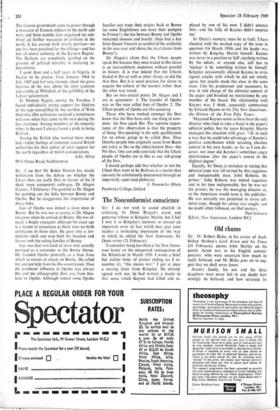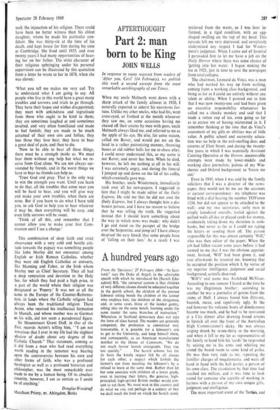Old chums Sir : Mr Robert Blake, in his review
of Arch- bishop Mathew's Lord Acton and his Times (14 February), quotes John Morley on the puzzle Acton was to his English contem- poraries, who were uncertain how much he really believed, and Mr Blake goes on to sug- gest that we shall never know.
Acton's family, his son and his three daughters were never left in any doubt how strongly he believed, and how seriously he took the injunction of his religion. There could have been no better witness than his eldest daughter, whom he made his particular con- fidant. She was thirty-six at the time of his death, and kept house for him during his time at Cambridge. She lived until 1955, and over twenty years I had many opportunities of hear- ing her on her father. The strict character of their religious upbringing under his personal supervision can be illustrated by this quotation from a letter he wrote to her in 1878, when she was eleven: 'What you tell me makes me very sad. Try to understand what I am going to say. All people who live in this world have a great many troubles and sorrows and trials to go through. They have their hopes and wishes disappointed; they meet with unkindness and ingratitude from those who ought to be kind to them; they are sometimes laughed at and sometimes insulted, and very often humiliated and made to feel foolish; they are made to be much ashamed of their own sins and follies; they lose those they love best; they have to bear a great deal of pain, and then to die.
'Now to be able to bear all these things, there must be a strength inside us. We must bear them without any help but what we re- ceive from God alone. We are not always sur- rounded by friends, and in the worst things we have to bear no friends can help us.
`Trust God and pray. That is the only way to win the strength you want. Until you learn to do that, all the troubles that come near you will be hard to bear, and you will give way and make your own troubles, when there are none. But if you learn to do what I have told you, to ask God to help you to bear whatever it may be, then everything will be easy, and even little sorrows will be sweet.
'Think of all this, and remember that I cannot allow you to make your first Com- munion until I see a change.'
This combination of deep faith and strict observance with a very cold and hostile atti- tude towards the papacy was something people like John Morley did not encounter among English or Irish Roman Catholics, whether they were old English Catholics or converts, like Manning and Faber, or the Irisb whom Morley met as Chief Secretary. They all had a deep veneration and devotion to the Holy See, for which they had paid a high price, in a part of the world where their religion was designated as 'Popery.' It was not at all the same in the Europe of the Counter-Reforma- tion, in lands where the Catholic religion had always been the traditional religion. There Acton, who received his intellectual formation in Munich, and whose mother was as German as his wife, did not seem a paradoxical figure.
Sir Mountstuart Grant Duff, in Out of the Past, records Acton's telling him, "I am not conscious that I ever in my life had the slightest shadow of doubt about any dogma of the Catholic Church." That statement, coming as it did from a man who had read everything worth reading in the remotest way bearing upon the controversies between his own and other forms of faith, who was a profound theologian as well as a profound historian and philosopher, was the most remarkable ever made to me by a human being. Of its absolute sincerity, however, I am as certain as I could be of anything.'
Douglas Woodruff Marcham Priory, nr. Abingdon, Berks



































 Previous page
Previous page